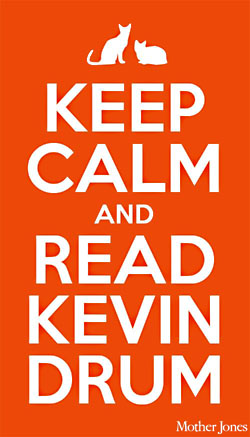 Mark Manson agrees that by all objective measures, the country is in pretty good shape these days. So is the rest of the world. And yet:
Mark Manson agrees that by all objective measures, the country is in pretty good shape these days. So is the rest of the world. And yet:
Like you, like seemingly everybody, I have also felt as though the world is spinning out of control and there’s nothing we can do about it. I’m exhausted from all the stories of shootings and attacks and bombs and the constant stream of awful stuff that is happening out there. I, too, feel desensitized and dejected from the seemingly constant carnage raging across the planet. And because this feeling is new and unique to me, my first assumption is that the world must be more fucked than it’s ever been before. After all, I never felt this way 10 years ago or 20 years ago. So things must be worse, right?
This is via Tyler Cowen, who says Manson’s explanation for this feeling is “not my view.” However, it is my view. Or at least partly my view, anyway. Manson concludes that things aren’t worse, but we’re now so overexposed to the worst parts of society that it’s hard to believe it:
Cameras, the internet, and most importantly, social media. This is what’s new….In the attention economy, people are rewarded for extremism. They are rewarded for indulging their worst biases and stoking other people’s worst fears. They are rewarded for portraying the world as a place that is burning to the ground, whether it’s because of gay marriage, or police violence, or Islamic terrorism, or low interest rates. The internet has generated a platform where apocalyptic beliefs are celebrated and spread, and moderation and reason is something that becomes too arduous and boring to stand.
And this constant awareness of every fault and flaw of our humanity, combined with an inundation of doomsayers and narcissistic nihilists commanding our attention space, is what is causing this constant feeling of a chaotic and insecure world that doesn’t actually exist.
….Outrageous news and information spread faster and further than any other form of information, dominating our daily attention. This is both good and bad. On the one hand, we become aware of some of the grossest injustices in our society as soon as they happen. On the other hand, all we hear about are the grossest injustices in our society as soon as they happen.
….This is our brave new world. When all information is freely available at the click of a mouse, our attention naturally nosedives in the sickest and most grotesque we can find….When we are exposed to police, we only see the worst 0.1% of police. When we are exposed to poor African Americans, we’re only exposed to the worst 0.1% of poor African Americans. When we’re exposed to Muslim immigrants, we only hear about the worst 0.1% of Muslim immigrants.
I think there’s a lot to this. I doubt that police killings of unarmed black men has gone up. In fact, it’s probably gone down. But now we know about it whenever it happens. Politics has always been divisive, but in the past we didn’t have full-color cable channels dedicated 24/7 to rubbing our noses in it. Minor outrages happened in communities all over the country, and most of them we never heard of. But in today’s outrage-driven social  media, every ignorant school board decision, every college kid who sends a dumb tweet, every city council member who emails a racist photo of President Obama—all of them become national news. This doesn’t mean that school boards, college kids, and city council members are any worse than ever. It’s just that we’re more exposed to it now.
media, every ignorant school board decision, every college kid who sends a dumb tweet, every city council member who emails a racist photo of President Obama—all of them become national news. This doesn’t mean that school boards, college kids, and city council members are any worse than ever. It’s just that we’re more exposed to it now.
This is hardly an all-embracing explanation of why we feel so chaotic and insecure. In fact, my guess is that the main explanation is that we don’t really feel more chaotic and insecure. We’ve just forgotten about how we felt in the past. Still, there’s something to this, and I agree that simple exposure to things that were formerly ignored has made the world seem worse. This is especially the case when interest groups insist on gathering up all these minor outrages on a weekly or monthly basis and blasting them out to their members. It’s how gun owners can think that gun rights are under assault and foodies can think that everything we put into our bodies is poisonous. Neither is true, but if you’re force fed a diet of small outrages constantly, it’s hard to disagree.
So what’s the answer? I don’t know, and it’s hardly unique to social media. I’ve long been convinced, for example, that local news is responsible for our often absurd fear of crime. It’s been dropping steadily for 20 years, but it still leads the local news nearly every day. How would anyone know that America is safer than it’s ever been?
My hope is that, like everything, we’ll eventually get bored with outrage. Or at least with the social media version of outrage. It’s a wan hope, perhaps, but in the meantime you can always read my blog.













